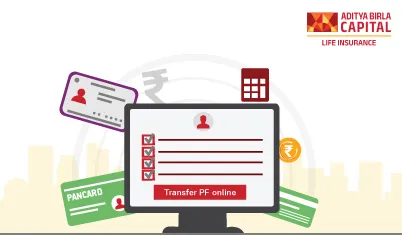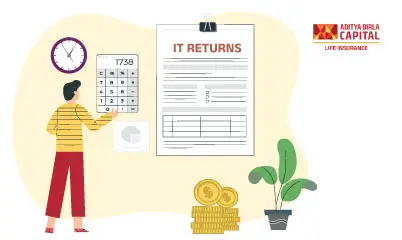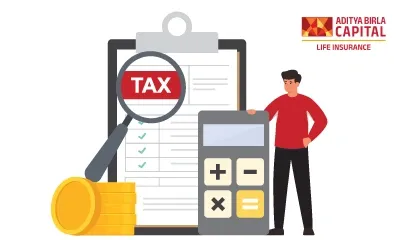Aditya Birla Sun Life Insurance Company Limited
Deduction Under Section 80EE

Plan Smarter, Live Better!

Thank you for your details. We will reach out to you shortly.

Currently we are facing some issue. Please try after sometime.


- Table of Contents
Are you a first-time homeowner feeling the weight of your home loan interest? What if there was a way to lighten that load a bit, especially when it comes to your taxes? Enter Section 80EE of the Income Tax Act, a boon for first-time homebuyers in India. But what exactly is Section 80EE, and how can it benefit you? Let’s delve into the details and uncover how this section can help you save on taxes, making the dream of owning a home more affordable.
What is Section 80EE?
Section 80EE of the Income Tax Act 1961, is specifically designed to provide tax relief to first-time homebuyers. It allows for an additional deduction on the interest portion of the home loan taken for purchasing a house. This deduction is over and above the deduction you can claim under Section 24 for interest on home loans. The goal of Section 80EE is to make homeownership more financially accessible to first-time buyers by offering them an extra avenue to reduce their taxable income.
Features of the 80EE Deduction
The 80EE deduction comes with specific features that distinguish it from other tax-saving options related to home loans. Here are its key characteristics:
-
Eligibility: The deduction is available only to individuals purchasing their first house. The individual must not own any other residential house property within the territory of India as on the date of sanction of the loan.
-
Loan Amount and Property Value: The home loan must not exceed ₹35 lakhs, and the value of the property should not be more than ₹50 lakhs.
-
Deduction Limit: It allows for an additional deduction of up to ₹50,000 per financial year on the interest paid on the home loan.
-
Loan Sanction Date: The loan must have been sanctioned between certain specified dates set by the government, indicating the period during which this benefit applies.
-
Possession: The deduction is applicable for loans taken for purchasing a residential house property, and the benefit can be claimed starting the year in which the loan was taken.
This deduction is particularly beneficial for young professionals and families embarking on their journey to homeownership, providing some relief in the initial years, which are often financially challenging. Understanding and claiming the 80EE deduction can significantly affect your overall tax planning and savings.
What are the conditions that should be met for claiming Section 80EE deductions?
To avail of the benefits under Section 80EE, certain conditions need to be met to ensure that the deduction is claimed correctly and in compliance with the tax laws:
1. First-Time Homebuyer: The deduction is exclusively for individuals buying their first residential house property.
2. Loan Amount and Property Value: The value of the house property must not exceed ₹50 lakhs, and the loan taken for this purpose should not be more than ₹35 lakhs.
3. Loan Sanction Date: The home loan must have been sanctioned by a financial institution between specific dates defined by the Income Tax Act.
4. No Ownership of Other Property: At the time of loan sanction, the taxpayer should not own any other residential property in their name.
5. Possession of Property: The deduction under Section 80EE is applicable only for the interest portion of the home loan, and the claim can be made starting from the year in which the loan was sanctioned.
6. Loan from a Financial Institution: The loan should be taken from a financial institution or a housing finance company for purchasing a residential house property.
Eligibility for claiming a deduction under section 80EE?
Eligibility criteria for claiming a deduction under Section 80EE include:
-
The taxpayer must be an individual; this benefit is not available to companies or Hindu Undivided Families (HUFs).
-
The taxpayer must be a first-time homebuyer.
-
The taxpayer must be resident of India
-
The taxpayer should not own any residential house property at the time of loan sanction.
-
The home loan must have been sanctioned by a financial institution or a housing finance company.
-
The loan and property value restrictions must be met as specified under the conditions for Section 80EE.
Section 80EE vs Section 24: Understanding the Difference
Here’s a comparison between Section 80EE and Section 24 to understand the differences clearly:
| Criteria | Section 80EE | Section 24 |
|---|---|---|
| Purpose | Provides additional deduction for interest on home loans for first-time homebuyers. | Deduction on interest paid on home loan for any residential property. |
| Deduction Limit | Up to ₹50,000 per financial year. | Up to ₹2,00,000 per financial year for a self-occupied property. No limit for rented-out property, but the set-off limit against other heads of income is ₹2,00,000. |
| Eligibility | Only for individual taxpayers who are buying their first home. | All individuals and HUFs taking a loan for residential property. |
| Property Value | The value of the property should not exceed ₹50 lakhs. | No specified limit on the value of the property. |
| Loan Amount | The loan amount should not exceed ₹35 lakhs. | No specified limit on the loan amount. |
| Loan Sanction Date | Loans should be sanctioned between specific dates as defined by the Act. | No specific date requirement. |
| Other Conditions | The taxpayer should not own any other residential house property on the date of loan sanction. | Applicable regardless of the number of properties owned. |
How to claim tax deductions under section 80EE of the Income Tax Act?
Claiming tax deductions under Section 80EE is straightforward, provided you meet the eligibility criteria. Here’s how you can claim this deduction:
1. Document Collection: Gather all necessary documents, including the home loan sanction letter from the bank or financial institution, interest payment certificates, and proof of ownership or registration of the property.
2. Compute Interest Payable: Determine the total interest paid on the home loan during the financial year. This information is usually available in the home loan statement provided by the lender. 3. Filing ITR: While filing your Income Tax Return (ITR), claim the deduction under Section 80EE for the interest paid on the home loan. Ensure you enter the correct amount up to the limit of ₹50,000 under the relevant section of the ITR form.
3. Filing ITR: While filing your Income Tax Return (ITR), claim the deduction under Section 80EE for the interest paid on the home loan. Ensure you enter the correct amount up to the limit of ₹50,000 under the relevant section of the ITR form.
4. Keep Documents Handy: Though not required to be submitted at the time of filing ITR, keep all relevant documents handy for any future reference or in case of scrutiny or query from the Income Tax Department.
How to Claim House Loan Interest in ITR?
To claim house loan interest in your Income Tax Return (ITR), follow these steps:
1. Interest Certificate: Obtain an interest certificate from your lender that specifies the amount of interest and principal repaid during the financial year.
2. ITR Form Selection: Choose the correct ITR form applicable to your income and situation. For most salaried individuals, this would be ITR-1 or ITR-2.
3. Deduction Under Section 24: Claim the deduction for interest on a house loan under Section 24 in the section provided for income from house property.
4. Deductions Under Section 80EE or 80EEA: If applicable, also claim deductions under Section 80EE or 80EEA by entering the interest amount paid under the respective sections of the ITR form.
5. Document Retention: Keep all relevant documents, such as the loan sanction letter and interest certificate safe for any future queries, if any from the Income Tax Department.
Difference Between Section 80EE and Section 80EEA
While Section 80EE provides benefits to first-time homebuyers, Section 80EEA offers additional benefits for affordable housing. Here’s a quick comparison:
| Criteria | Section 80EE | Section 80EEA |
|---|---|---|
| Eligibility | First-time homebuyers. | Buyers of affordable housing (specific conditions apply). |
| Deduction Limit | Up to ₹50,000. | Up to ₹1,50,000 over and above Section 24 benefits. |
| Loan Sanction Date | Between specific dates as defined by the Act. | Loans sanctioned from 1st April 2019 to 31st March 2022. |
| Property Value | The value of the property should not exceed ₹50 lakhs. | The stamp duty value of the house should not exceed ₹45 lakhs. |
| Other Conditions | No other residential property should be owned on the loan sanction date. | The taxpayer should not own any residential house property on the date of sanction of the loan. |
Conclusion
Understanding and claiming deductions under Sections 80EE and 80EEA can lead to substantial tax savings for those purchasing their first home or investing in affordable housing. By carefully navigating these sections, first-time homebuyers can lessen the financial burden of home loans through tax deductions. It’s essential to keep accurate records and remain informed about the latest tax laws to enjoy these benefits. Remember, these deductions are designed to encourage homeownership among a wider segment of the population, making it slightly easier to own a home in today's economy.
Thank you for your details. We will reach out to you shortly.
Thanks for reaching out. Currently we are facing some issue.
Buy ₹1 Crore Term Insurance at Just ₹575/month1
ABSLI DigiShield Plan
Life cover up to 100 years of age.
Joint Cover Option
Inbuilt Terminal Illness Benefit
Tax Benefit^
Return of Premium Option~
Life Cover
₹1 crore
Premium:
₹575/month1
Most Popular Calculator
Guaranteed returns after a month¹
ADV/5/24-25/247







